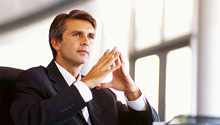You never really learn much from hearing yourself speak.
—George Clooney, actor, director
 Have you ever listened to a CEO of a major company speak and wonder how in the world that person got to be CEO? Perhaps this “imposter” is not very articulate at all, or has no clue about the company and seems to be more like a figurehead than a deserving CEO. I think we all have experienced this scenario at one time or another.
Have you ever listened to a CEO of a major company speak and wonder how in the world that person got to be CEO? Perhaps this “imposter” is not very articulate at all, or has no clue about the company and seems to be more like a figurehead than a deserving CEO. I think we all have experienced this scenario at one time or another.
When sizing up CEOs, we often make a huge mistake of trying to fit them into a box. There are so many stereotypes of what a CEO of a certain company should be like. For instance, a cool tech start-up should have a spindly, baby-faced young male who wears a hoodie and flip-flops. He speaks passionately and is knowledgeable, but his cadence is robotic. On the other hand, a financial services company should have an athletic, well-groomed male who wears an expensive suit with highly polished shoes. He is confident and charming. I could go on, but you get the idea. Whenever a CEO doesn’t fit nicely into our stereotype, we automatically question the company.
The reality is that CEOs come in all different forms, and more often than not we are unable to fully witness all the talents of a CEO, especially if she is only speaking on a panel. Not every CEO is like Steve Jobs, who seemed to have it all—from piercing intelligence to amazing intuition. (We’ll forget about the turtlenecks and temper tantrums for the moment.) Some CEOs are brilliant technologists. Others are great managers and know how to bring the best out of their people, and some CEOs are just great visionaries. As I matured as an entrepreneur, I learned to respect all types equally, but there was one experience I had at a young age that enabled me to begin to really appreciate the variety and its value.
Shortly after I decided to become an entrepreneur and started my first company, I attended a panel with a highly respected and venerated CEO in Atlanta. This CEO was a legend. Because of his larger-than-life reputation and tremendous success, I expected him to be the quintessential CEO. You know: charming, tall, and teeming with confidence. He was the complete opposite. In fact, I couldn’t help but feel sorry for the man at times during his interview, because he could barely form a basic sentence with subject and verb. It was extremely difficult to follow him. Boy, was I in for a surprise, though. Despite my initial disappointment and difficulty in understanding him, I learned one of the biggest lessons I’ve learned during my several years as an entrepreneur. Toward the end of the panel, he looked at the large audience and said while stuttering, “I may not be the best speaker or the most articulate, but I know how to put together the right people. And I don’t have to be the smartest person in the room all the time.”
His final comment was so powerful and sums up my point. That evening, I learned that the most successful CEOs are the most humble. They know that they don’t have all the answers; they know that they need help. If you are one of those entrepreneurs full of bravado who knows everything and is unwilling to listen to and to hire others, especially those smarter than you, you’ll only get so far. The best entrepreneurs don’t always have to be the smartest one in the room. They know better.

